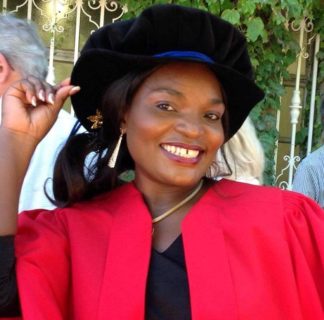Article begins

Image description: A woman wearing a black hat and red graduation gown over a black shirt smiles as she holds the rim of a black cap between thumb and index finger.
Caption: Mutale Chileshe
1978‒2021
Mutale Chileshe, the unit head for society in medicine at Zambia’s Copperbelt University School of Medicine, made a powerful impact as an anthropologist teaching within a medical school. As Chileshe posited in Anthropology in Medical Education, to make such an impact as a Zambian anthropologist was no easy feat. The discipline, she wrote, was once viewed across the continent as a tool of colonialism; the disdain was so strong that African scholars once urged a complete ban.
Born in 1978, Chileshe made her way with encouragement from parents, Sylvester and Beatrice Chileshe, and family, Bwalya, Mulenga, Mubanga, Mwaka, and Chileshe Chino. What would become her research focus, the importance of caregiving, began early when her mother, Mary, passed away unexpectedly. She earned a social work degree at University of Zambia and later joined anthropologist Virginia Bond’s team at Zambart and received an MSc in anthropology, studying rural households affected by TB-HIV. She went on to earn a PhD in 2014 in environmental and geographical science at the University of Cape Town. Her thesis examined how Zambian households handled food security as the copper mining industry disintegrated. The ethnographic approach she employed to illuminate how communities maintain food security while enduring economic decline, said Jane Battersby, Chileshe’s dissertation supervisor, is of relevance now as the “new poor” are faced with covariate COVID-related economic hardships.
The poverty and suffering she witnessed during her research at Zambart, and in her MSc and PhD studies, took their toll on Chileshe:
Looking back at my fieldwork experiences over the past twelve years, the most challenging were in the context of my research with vulnerable and poor households about food, … and not being in the position to give assistance. This left me with a mixture of guilt, anger, and helplessness; guilty because I had on some occasions thrown away food, while anger and helplessness were associated with my lack of capacity to offer assistance. (2016)
These experiences motivated her, and she was tireless in her social justice work, said Sam Miti, physician-researcher at Arthur Davison Children’s Hospital, who explained, “Few had her energy and passion.”
Chileshe joined Copperbelt University School of Medicine in 2015. She often asked her students, “What will you be remembered for?” never giving students an option to quit and helping those with financial, family, or health issues. For Chileshe, caregiving was an essential—but overlooked—part of medicine and medical education. She taught hundreds of medical students to pay attention to their patients’ caregivers, and she also supported caregivers she met, often using her own money. Zambia’s Chipulukusu community was especially dear to her; she regularly visited families there with her students to cook and chat and identify ways to provide meaningful support.
Chileshe was the embodiment of joie de vivre, exuberant in both her personal and professional life. She was forever juggling tasks, heading out early to join her running club, going into the hospital and surrounding communities with her students, cajoling students to keep going after a fail, or driving 320 kilometers to her Lusaka home, just to have dinner with family. She was in the midst of a collaborative project at a children’s hospital, collecting data and writing between lectures, while holding her team together with her insightful analyses, advice, and well-timed sense of humor. Her zest for life was ever-present. Battersby recalled a supervisory session during graduate school in which Chileshe arrived “with no voice the day after Zambia won the African Cup of Nations in 2012. I jokingly said, ‘I hope you’ve not lost your voice because you were up all night screaming about the football.’ There was that smile, and a hoarsely whispered voice reply of, ‘Yes.’”
Chileshe had COVID-19, and died after delivering her son, Nkumbu. She leaves behind her precious baby, beloved husband Kelvin, cherished family members, and many friends. She recently penned, “It is also my hope that my work provides useful insight and positively influences the future careers of anthropologists who are currently engaged or considering a career in medical education.” Indeed, she has already achieved that goal, both within and outside of the discipline she promoted and loved.
(Jean Hunleth and Mary S. Willis)
Cite as: Hunleth, Jean and Mary S. Willis. 2021. “Mutale Chileshe.” Anthropology News website, May 6, 2021.

